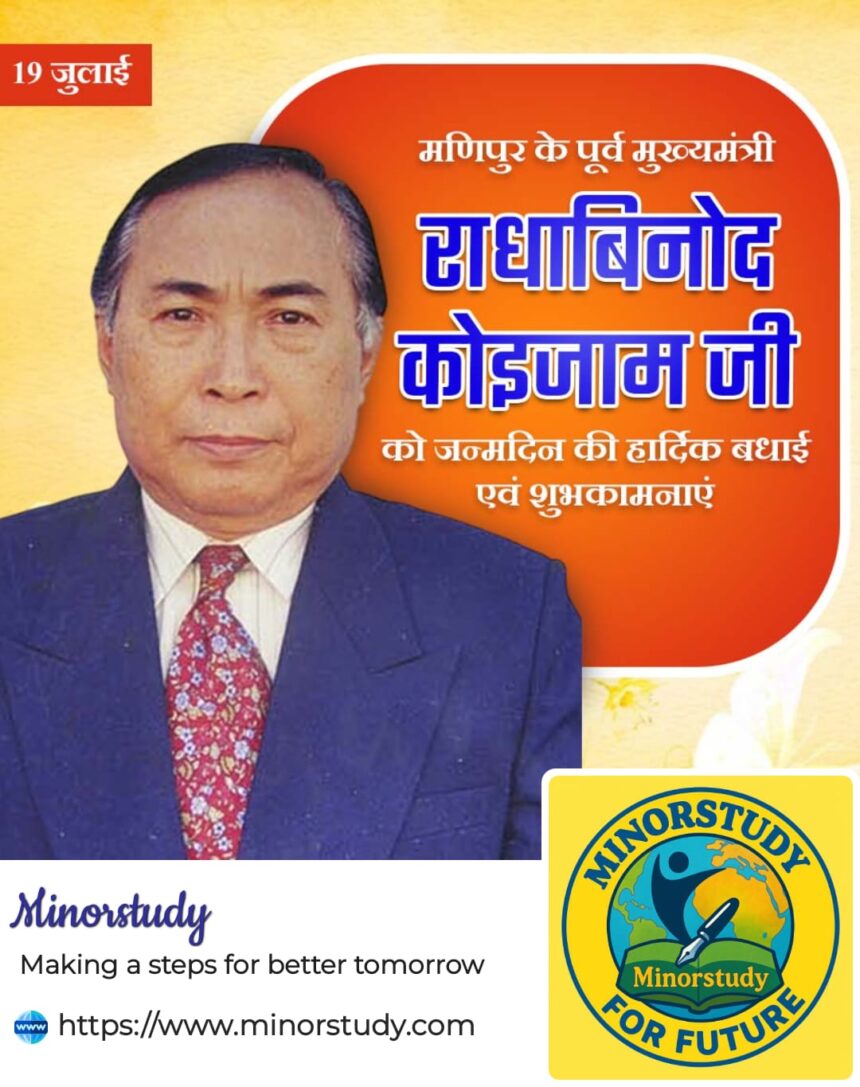🌟 7 Underrated Yet Powerful Moments in Radhabinod Koijam’s Political Journey That Shaped Manipur
In the vast mosaic of Indian politics, certain figures may not dominate headlines daily, but their influence runs deep, particularly in regions often overlooked on the national stage. One such name is Radhabinod Koijam, former Chief Minister of Manipur, who left a lasting impact on the state’s governance, political reform, and social dynamics.
- 🧑🏫 Who is Radhabinod Koijam?
- 📜 Historical Background
- 🗂️ Timeline: Radhabinod Koijam’s Political Journey
- 📌 7 Powerful Contributions and Facts About Radhabinod Koijam
- 1. 🏛️ Shortest Yet Symbolic Tenure as CM
- 2. 🧩 Coalition Builder in a Fractured House
- 3. 📚 Voice for Education and Reforms
- 4. 💡 Promoted Peace Amid Ethnic Tensions
- 5. 🚀 Introduced Transparency in Governance
- 6. 🗳️ Multi-Party Political Experience
- 7. 🌿 Environmental and Social Concerns
- 🤔 Frequently Asked Questions (FAQs)
- ❓ Why is Radhabinod Koijam’s tenure remembered despite being short?
- ❓ Did he play a role after 2001 in governance?
- ❓ What were his views on insurgency?
- ❓ Which party did he serve the longest?
- 🎯 Significance of Radhabinod Koijam in Indian Politics
- 🌍 Importance in Our Daily Life
- 🎉 Observance and Legacy
- 🎈 Wishes & Messages
- 🧠 5 Key Lessons from Koijam’s Life
- 🧾 Conclusion: The Quiet Statesman India Should Not Forget
This article offers a deep and human-centric view into the life, leadership, legacy, and lessons from Mr. Radhabinod Koijam’s political journey — rich with history, timelines, significance, societal impact, and practical insights for everyday life.
🧑🏫 Who is Radhabinod Koijam?
Full Name: Radhabinod Koijam
Born: 1948, Imphal, Manipur
Profession: Politician, Social Activist
Known For: Former Chief Minister of Manipur
Political Affiliations: Indian National Congress, Samata Party, Bharatiya Janata Party (BJP), Nationalist Congress Party (NCP)
A seasoned political personality from the northeastern state of Manipur, Radhabinod Koijam’s political contributions may seem subtle, but they have greatly influenced the democratic and development narrative in the region.
📜 Historical Background
📌 Manipur’s Political Landscape
The political history of Manipur is complex and dynamic, marked by instability, ethnic diversity, insurgency issues, and administrative challenges. In such an environment, Koijam emerged as a calm, diplomatic voice, working across party lines to build unity and improve governance.
🗂️ Timeline: Radhabinod Koijam’s Political Journey
| Year | Event |
|---|---|
| 1948 | Born in Imphal, Manipur |
| 1995 | Elected as Member of Manipur Legislative Assembly |
| 2001 | Sworn in as the Chief Minister of Manipur |
| 2002 | Served briefly before the government fell due to instability |
| 2002–2010 | Shifted to Nationalist Congress Party (NCP) |
| 2015 | Joined Bharatiya Janata Party (BJP) |
| 2020s | Continues to be active in public life and policy discourse |
📌 7 Powerful Contributions and Facts About Radhabinod Koijam
1. 🏛️ Shortest Yet Symbolic Tenure as CM
Koijam served as Manipur’s CM from 15 February to 1 June 2001, heading a Samata Party-led coalition government. Though brief, his tenure emphasized ethnic inclusivity and anti-corruption efforts.
2. 🧩 Coalition Builder in a Fractured House
He was instrumental in uniting fragmented regional voices, bringing together various MLAs from different ethnic communities to form a majority during a time of volatile politics.
3. 📚 Voice for Education and Reforms
Throughout his political career, Koijam advocated for educational reforms, pushing for quality schooling and infrastructure development, especially in remote areas of Manipur.
4. 💡 Promoted Peace Amid Ethnic Tensions
His calm demeanor and dialogue-based leadership helped maintain relative peace during politically sensitive periods in Manipur’s history.
5. 🚀 Introduced Transparency in Governance
Even in a brief tenure, Koijam initiated processes to bring transparency and decentralization, paving the way for better citizen participation.
6. 🗳️ Multi-Party Political Experience
Having worked with INC, Samata Party, NCP, and BJP, Koijam holds a rare distinction of understanding politics from diverse ideological perspectives — always putting Manipur’s development above party lines.
7. 🌿 Environmental and Social Concerns
He consistently voiced concerns about deforestation, drug abuse, and the impact of insurgency on youth — topics crucial for societal healing and sustainable development.
🤔 Frequently Asked Questions (FAQs)
❓ Why is Radhabinod Koijam’s tenure remembered despite being short?
Because of his integrity, peace efforts, and attempts to rebuild fractured governance, especially when Manipur was facing deep political crises.
❓ Did he play a role after 2001 in governance?
Yes. Though not in executive power, Koijam continued as a legislator, advisor, and political mentor, influencing administrative and party-level decisions.
❓ What were his views on insurgency?
He believed in dialogue over military force, often promoting negotiated peace processes with insurgent groups for lasting harmony.
❓ Which party did he serve the longest?
While he moved through various parties, his most stable political involvement was with the Nationalist Congress Party (NCP), followed by the BJP.
🎯 Significance of Radhabinod Koijam in Indian Politics
✅ For Manipur:
Brought a voice of reason during chaos.
Tried to balance tribal and valley interests.
Introduced ethical leadership, a rare trait in regional politics.
✅ For India:
Set a template for managing sensitive border states with respect and inclusion.
Advocated for the integration of Northeast India into national consciousness.
🌍 Importance in Our Daily Life
Though not a national celebrity, Koijam’s ethical conduct, soft-spoken leadership, and cross-community empathy provide a model for:
🧑💼 Ethical leadership at local and national levels
🏫 Grassroots educational activism
🕊️ Peace-building through dialogue
🧠 Political awareness in youth from underrepresented regions
🌱 A focus on environment-friendly development
🎉 Observance and Legacy
While there’s no dedicated day for Koijam, many local political events and commemorations reflect on his legacy during leadership transition events, particularly when discussing coalition-era governance in Manipur.
He’s also invited to university talks, political panels, and community gatherings in the northeast for his insightful policy advice.
🎈 Wishes & Messages
🕊️ “To Radhabinod Koijam Ji — your leadership was short but its impact echoes through time. Manipur remembers you with gratitude.”
🏛️ “You’ve proven that powerful leadership is not in loud speeches but in calm solutions. May your legacy inspire the youth of the Northeast.”
🧠 5 Key Lessons from Koijam’s Life
🤝 Coalitions require character more than charisma.
🧭 In complex issues, calm clarity wins over aggressive politics.
🧒 Focus on education creates generational change.
⚖️ Ethnic balance is the key to lasting peace in diverse societies.
📜 Even short leadership can leave a long legacy.
🧾 Conclusion: The Quiet Statesman India Should Not Forget
Radhabinod Koijam life is a testament to how even a short political term, when driven by vision and values, can become a powerful chapter in history.
In a world craving stability, his leadership reminds us that quiet diplomacy, integrity, and respect for diversity are not signs of weakness — but the foundation of true strength.
He may not have the limelight of Delhi, but in the heart of Manipur, Koijam is a respected name, and to many, a forgotten hero of calm governance.








